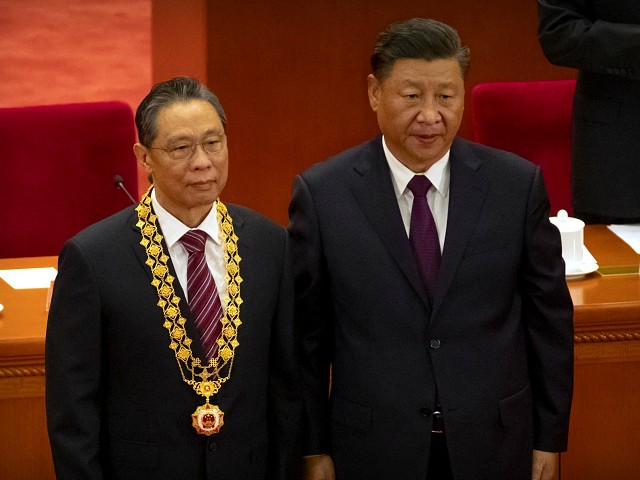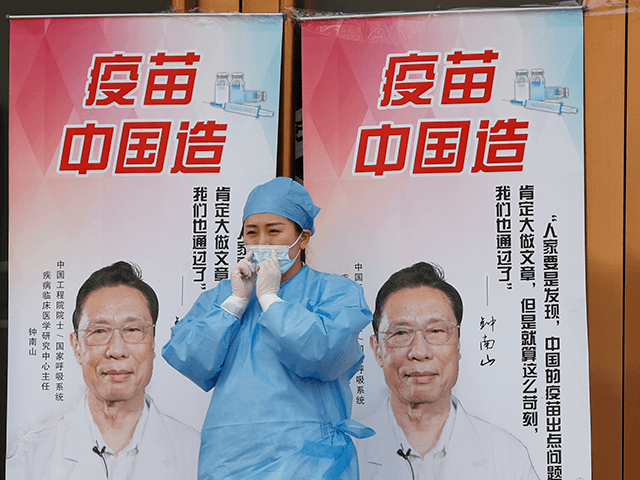Chinese state media on Tuesday reportedly deleted an article published on Monday in which China’s top coronavirus expert, Zhong Nanshan, argued that China needs to abandon the ruling Communist Party’s Chinese coronavirus policy of “zero-Covid” and join the rest of the world in “reopening” to live a post-pandemic life, the South China Morning Post (SCMP) reported.
Detailing the apparent act of censorship by the Chinese Communist Party on April 19, the Hong Kong-based SCMP wrote:
China’s top Covid-19 [Chinese coronavirus] expert Zhong Nanshan has said the country cannot pursue “dynamic zero-Covid” in the long term and should reopen to bring social and economic development back to normal, and adapt to global reopening.
The editorial titled “Strategies for reopening in the forthcoming Covid-19 era in China” was published in the English-language National Science Review journal on April 6. A Chinese translated copy of the article was published
on mainland news sites on Monday but has since been deleted.“China needs to reopen so as to normalise socio-economic development and adapt to global reopening. Prolonged dynamic zeroing cannot be pursued in the long run,” Zhong wrote with co-author Guan Weijie, an associate researcher with the State Key Laboratory of Respiratory Disease in Guangzhou.

Chinese President Xi Jinping stands with Chinese medical expert Zhong Nanshan after awarding him a medal at an event to honor some of those involved in China’s fight against COVID-19 at the Great Hall of the People in Beijing, Tuesday, Sept. 8, 2020. (AP Photo/Mark Schiefelbein)
The Chinese Communist Party’s censoring of Zhong Nanshan seems especially noteworthy as he was previously hailed as “China’s Fauci” earlier in the pandemic for pushing the Party’s official anti-epidemic agenda. Dr. Anthony Fauci serves as the director of the U.S. National Institute of Allergy and Infectious Diseases and is the Chief Medical Adviser to U.S. President Joe Biden. Fauci served as a lead member of the White House Coronavirus Task Force under the presidency of former U.S. President Donald Trump.
China’s “zero-Covid” policy adheres to a “zero tolerance” approach to the Chinese coronavirus. The Chinese Communist Party established the strategy “early in the pandemic and [it] has involved large-scale lockdowns, mass testing and international travel bans,” according to the British scientific journal Nature.
China’s “zero-Covid” approach to the pandemic “has been under pressure since China’s first Omicron cases were reported in mid-December,” Nature observed in late January.
The omicron strain of SARS-CoV-2 — which is the official name for the type of coronavirus that causes the disease known as Covid-19 (alternatively known as the Chinese coronavirus) — is highly transmissible and produces significantly milder symptoms than previous variants of the virus. It has become the dominant Chinese coronavirus strain worldwide, including in China, in recent months and has thus thwarted Beijing’s efforts to stamp out SARS-CoV-2 at all costs.
This futile effort has been most recently witnessed in Shanghai, where all of the city’s roughly 26 million residents have been forced into total lockdown since April 5 to contain a largely omicron outbreak of the Chinese coronavirus. The vast majority of the city’s Chinese coronavirus patients have been asymptomatic, though this has not stopped local Communist Party officials from treating the epidemic with life or death levels of brutality, such as separating babies and children from their parents during forced quarantines. Shanghai residents have suffered from food shortages since at least early April while sealed inside their homes during the city-wide lockdown, which began in targeted forms on March 28 before expanding to include all of the metropolis on April 5.

COMMENTS
Please let us know if you're having issues with commenting.